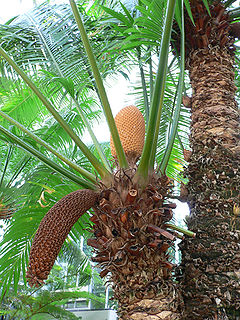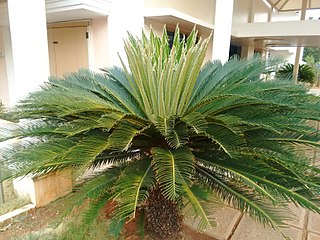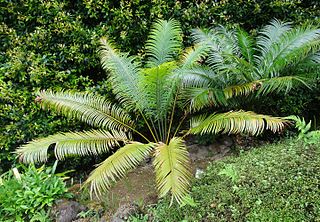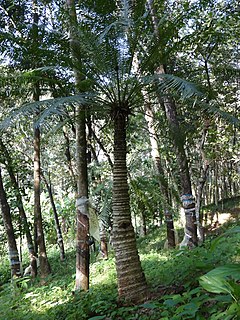
Cycads are seed plants that typically have a stout and woody (ligneous) trunk with a crown of large, hard, stiff, evergreen and (usually) pinnate leaves. The species are dioecious, that is, individual plants of a species are either male or female. Cycads vary in size from having trunks only a few centimeters to several meters tall. They typically grow very slowly and live very long, with some specimens known to be as much as 1,000 years old. Because of their superficial resemblance, they are sometimes mistaken for palms or ferns, but they are not closely related to either group.

Cycas is a genus of plants belonging to a very ancient lineage, the Cycadophyta, which are not closely related to palms, ferns, trees or any other modern group of plants. They are evergreen perennials which achieved their maximum diversity in the Jurassic and Cretaceous periods, when they were distributed almost worldwide. At the end of the Cretaceous, when the non-avian dinosaurs became extinct, so did most of the cycas in the Northern Hemisphere.

Cycas revoluta, is a species of gymnosperm in the family Cycadaceae, native to southern Japan including the Ryukyu Islands. It is one of several species used for the production of sago, as well as an ornamental plant. The sago cycad can be distinguished by a thick coat of fibers on its trunk. The sago cycad is sometimes mistakenly thought to be a palm, although the only similarity between the two is that they look similar and both produce seeds. The leaves grow from the trunk and start out as small leaves near the centre of the plant.

The Cruising Yacht Club of Australia (CYCA) was established in 1944 in Darling Point, inner-east Sydney. The club is known as one of Australia's premier yacht clubs, and is acknowledged as one of the leaders in ocean racing in the country. The club hosts the annual Sydney to Hobart Yacht Race.

Cycas angulata is a species of cycad in the genus Cycas, native to Australia in northeast Northern Territory and northwest Queensland.

Cycas armstrongii is a species of cycad in the genus Cycas, endemic to Northern Territory of Australia. It is found from the Finniss River in the west to the Arnhem Highway in the east, north of Pine Creek. It also occurs on the Tiwi Islands and the Cobourg Peninsula
Cycas badensis is a species of cycad in the genus Cycas, native to Australia, in the extreme north of Queensland, where it is endemic on Badu Island in the Torres Strait Islands.
Cycas basaltica is a species of cycad in the genus Cycas, native to Australia, in the far north of Western Australia in the Kimberley region.

Cycas beddomei is a species of cycad in the genus Cycas, native to India, where it is confined to a small area of Andhra Pradesh state in the Tirumala Hills in scrubland and brush covered hills.

Cycas bougainvilleana is a species of cycad in the genus Cycas, native to the islands northeast of Papua New Guinea, on New Britain, the Bismarck Archipelago and the Solomon Islands, where it occurs on or near the coast in calcareous coral sand dunes and in adjacent forests.

Cycas circinalis, also known as the queen sago, is a species of cycad known in the wild only from southern India. Cycas circinalis is the only gymnosperm species found among native Sri Lankan flora.

Cycas micronesica is a species of cycad found on the island of Yap in Micronesia, the Marianas islands of Guam and Rota, and The Republic of Palau. It is commonly known as federico nut or fadang in Chamorro. The species, previously lumped with Cycas rumphii and Cycas circinalis, was described in 1994 by Ken Hill. Paleoecological studies have determined that C. micronesica has been present on the island of Guam for about 9,000 years. It is linked with Lytico-Bodig disease, a condition similar to amyotrophic lateral sclerosis (ALS), due to the neurotoxin BMAA found in its seeds, which were a traditional food source on Guam until the 1960s. The neurotoxin is present due to its symbiosis with cyanobacteria.
Echinolittorina sundaica is a species of sea snail, a marine gastropod mollusk in the family Littorinidae, the winkles or periwinkles.

Cycas rumphii, commonly known as queen sago or the queen sago palm, is a dioecious gymnosperm, a species of cycad in the genus Cycas native to Indonesia, New Guinea and Christmas Island. Although palm-like in appearance, it is not a palm.

Cycas thouarsii, the Madagascar cycad, is an evergreen arborescent cycad in the genus Cycas. It is named after a French botanist Louis-Marie Aubert du Petit-Thouars (1758—1831).

Cycas zeylanica, common name maha-madu is a plant apparently at present endemic to the Andaman and Nicobar Islands. It was formerly also present in Sri Lanka, but the last remnants of the populations there were destroyed by the tsunami of December 2004.
Cycas changjiangensis is a plant species in the cycad order, Cycadales. It is endemic to Hainan Island of southern China. It grows at elevations of 600–800 metres (2,000–2,600 ft). It is found only in a small area in Bawangling 霸王岭国家森林公园, Changjiang County, western Hainan Province, China.

Cycas wadei is a species of cycad endemic to Culion island, Philippines. There is only one subpopulation of about 5,000 mature individuals, located in a small area to the east of Halsey Harbor.
Cycas shanyaensis is a species of cycad endemic to Hainan, China.













